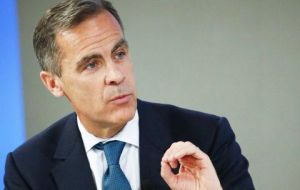MercoPress. South Atlantic News Agency
Bank of England rate hike, but “policy needs to walk not run”, says Carney
 Carney said Brexit negotiations “are entering a critical period.” BoE forecasts are based on the assumption of “a relatively smooth transition” out of the EU
Carney said Brexit negotiations “are entering a critical period.” BoE forecasts are based on the assumption of “a relatively smooth transition” out of the EU The Bank of England announced a rate hike despite ongoing uncertainty over the future of the U.K. economy. The Monetary Policy Committee voted unanimously for an increase in rates from 0.5 to 0.75% on the back of a strong labor market and credit growth.
The central bank said in a statement that if its macroeconomic forecasts proved right, the BOE would probably have to increase rates further, albeit gradually. In its latest inflation report, released on Thursday, forecasts show that consumer price rises will hit 2.2% in 2019 and 2.1% in 2020.
The change in interest rate will bring higher costs for those borrowing money, including mortgages. On the other hand, it will likely benefit savers.
Governor Mark Carney told reporters on Thursday that economic growth rebounded in the second quarter, after a slight slowdown at the start of the year. Carney said the slower economic activity seen in the first quarter was caused by cold weather.
“The bigger picture, however, remains one of external cost-pressures easing, with the peak impact on inflation from the referendum-related fall in sterling now behind us, and domestic inflationary pressures continuing to build as slack is absorbed,” Carney said.
The BOE moved the interest rate from 0.25 percent to the level of 0.5 percent last November — marking the first hike in more than 10 years. The decision reversed an earlier cut in August 2016 in the wake of the Brexit vote.
The bank said in the statement that it recognizes “that the economic outlook could be influenced significantly by the response of households, businesses and financial markets to developments related to the process of EU withdrawal.”
Brexit remains the biggest uncertainty lingering over the U.K. economy. Negotiating teams for both Britain and the European Union want to reach an agreement by October ahead of the U.K.'s departure date of March 29 next year. However, there are still significant divergences on the table, with policymakers also preparing for a no-deal scenario.
Speaking after the meeting, Carney said that Brexit negotiations “are entering a critical period.” He added that the forecasts and decisions taken by the central bank are based on the assumption that there will be “a relatively smooth transition” out of the European Union.
In such an event, trade between the U.K. and Europe would become more expensive for businesses and would likely see goods take much longer to reach their destination. The London Stock Exchange said on Thursday that it had put together a contingency plan for a no-deal eventuality. This would include building new entities in the EU.
Traders were initially surprised by the unanimous vote on the rate increase, which was interpreted as quite hawkish. However during the press conference, Carney repeated that rates will be moving gradually. He said that monetary “policy needs to walk not run.”




Top Comments
Disclaimer & comment rulesCommenting for this story is now closed.
If you have a Facebook account, become a fan and comment on our Facebook Page!